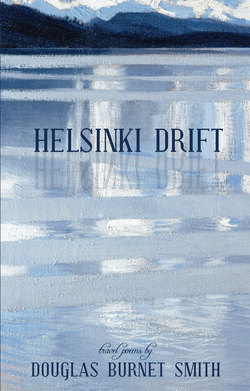Читать книгу Helsinki Drift - Douglas Burnet Smith - Страница 8
Оглавление(i) Eleventh-Century Japanese Body Armour, Heathrow Airport
Jets taxi
the tarmac
like slugs.
In a smeared display
case, dragons
swirl on a jade breastplate,
spew clouds over Fujiyama—
black, thick, etched
smoke swallowing
plum trees,
surprised farmers.
Jaded passengers
scurry, purchase
flight insurance,
carry-on bags filled
with the end
of the twentieth century.
(ii) Bodhidarma Crossing the Blue River on a Reed (Chinese, Eighth Century, Artist Unknown)
each act
a cloud inconceivable
not to be
emptied
out of so
float
on the fiction
of the current
ARRIVAL LOUNGE ANXIETY ANTI-HAIKU
destinations
ricochet
over the red
shoulder bag
no one claims
LAKE DISTRICT RHYME, STONE COTTAGE
Mountain grosbeaks scorch early apple boughs;
Culvert echoes drown a rumbling train;
Snow asks forgiveness all the way to clouds—
And the kettle on the stove has the nerve to complain!
CLOUDS OVER TEIGNMOUTH (KEATS’S APPARITION ANTI-HAIKU)
tubercular,
they crave
the blood-drawn sunset
that pales
like a crazed face
Black medick, sea beet, spear thistle,
pellitory of the wall—the wind
comes up from the Channel wild over cliffs
and pushes these flowers
flat.
Lean
into the wind. Step over
mole barrows, tawny mole pebbles.
Hope for the ghost of the poet
to waddle into view
like some swan
in a black cape,
walking stick,
prim nurse beside him
bustling in furbelows.
But there’s just a cross, a cold, useless
iron fence around it, far off
a black freighter going grey.
Isle of wight
At the edge of it,
you find the one small stone
that has been there since
smoothness won—
a bracelet’s pink barn,
a polished steeple.
Walking into it,
ice-fiery currents peel
your knees.
Grace
deepens with every numbing step.
Kintyre
Who,
tired of surface, tied
that white boat, left it
to float by the spiderleg pier?
Only dark birds
know who let it rot
over itself, mirror its
oarlessness and the one thin seam
that suddenly
like a mouth
opened to allow everything
oceanic in.
Gigha
Bring me a candle, Brown, and let me see this blood.
—February 3, 1820
A little swoon
by a lilac
and a screen
of Victorian trees, laurel
and yew
is given over
to his low fence,
the hedge of laurustinus
and China roses,
mulberry shade.
A paltry nightingale,
coughing words,
a dark-spotted
handkerchief:
“sitting and sobbing”
at the end
of Well Walk.
Words like
baleful and timbral seem to write themselves
on thick paper
he used for travel
notes, silhouettes,
coughing anguished
slang. Surgery
of the wind
squeaking
out his lung,
the one still
responding—
dark pendant,
eloquent membrane
exhaling candlelit
letters into the air.
